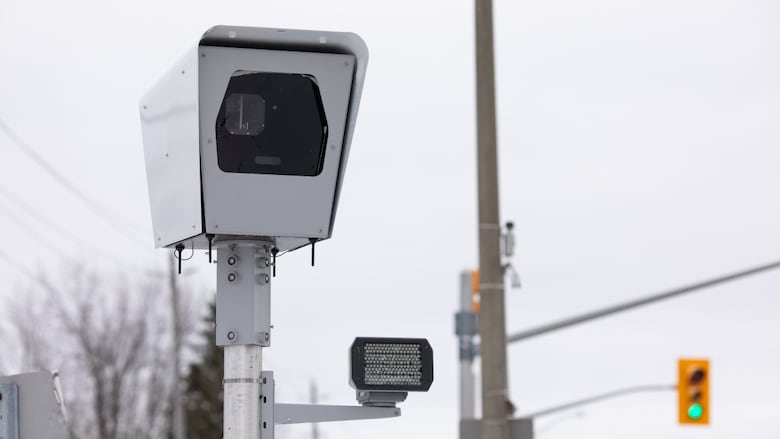CAA survey suggests 73% of Ontarians support speed cameras, even as cams are cut down
Majority of respondents say they slow down when nearing speed enforcement cameras

A new survey suggests Ontarians broadly support automated speed enforcement, but its release comes as Toronto speed cameras continue to be chopped down.
A Canadian Automobile Association South Central Ontario survey, conducted by market researcher DIG Insights and released Wednesday, finds 73 per cent of respondents support automated speed enforcement.
The survey, which was conducted from March 7 to 19 and surveyed 1,500 Ontario drivers 18 or older, also found 76 per cent of respondents believe cameras deter speeding.
The findings also suggested 73 per cent of those surveyed reported slowing down when nearing an automated speed enforcement camera and 52 per cent said they were unlikely to speed up again once they pass one up from 44 per cent in 2023.
CAA community relations consultant Michael Stewart says this year's results suggested a bigger jump in tickets received than in years past.
"If you have more cameras running automated speed enforcement, you will probably catch more drivers speeding, depending on what that speed is," he said in an interview with CBC Toronto.
The survey found 23 per cent of respondents reported receiving a ticket from an automated speed enforcement camera, compared to 17 per cent in 2024.
25 cases of speed cam vandalism since 2024: city
Earlier this year, the city doubled the number of automated speed cameras it uses to 150. Meanwhile, there have been 25 cases of vandalism to speed cameras in 2024 and 2025, the city told CBC Toronto in an emailed statement Wednesday.
Overall, the survey findings suggest driver behaviours are changing, with 46 per cent of respondents reporting that they avoid roads with automated speed enforcement measures. That doesn't necessarily mean they're taking the reckless driving elsewhere, Stewart says.
"Sometimes, people just don't want to risk an automated speed enforcement ticket so they found a new way to get to where they need to go," he said. "Maybe it's taking streets that have higher speed limits so they can travel at those speeds."

Stewart added that in Ontario, anything over the posted limit is speeding and increases one's chance of a collision.
"We don't want a driver to be involved in a crash. We don't want a pedestrian to be involved in a crash. So we really want to remind people that the posted speed limit is the speed limit for a reason," he said.
Speed camera debate ongoing
While the survey demonstrates strong support for speed cameras, Toronto saw 11 of its speed cameras vandalized in the first week of July. The Parkside Drive speed camera was chopped down a sixth time in just eight months at the beginning of July.
Humber River-Black Creek Coun. Anthony Perruzza has said the city's speed camera program should be put on hold until September, calling them "speed traps."
He later said he would work with Mayor Olivia Chow on amendments to a city report to the infrastructure committee on Vision Zero, Toronto's road safety strategy.
"I think you see the angst with respect to the cameras because drivers don't see the camera. They don't know what the speed limit is because we don't make them clear. And then they get caught with a speed trap and then they react badly because you feel like there's this gotcha moment," he said.
Perruzza says there needs to be better signage and suggested painting or wrapping the cameras in a visible colour.
"Ultimately that's what we want to do, is change behaviour and make certain areas safer and not punish people monetarily," he said.
Perruzza also says drivers who are first-time offenders are getting ticketed by speed cameras but shouldn't.

Stewart says, no matter what, people shouldn't be vandalizing cameras. But he says the frustration does open up room for conversation and encourages the public to reach out to the city to better understand the reasons for them.
With back to school season coming soon, the enforcement measures are all the more important, he says.
"There will be a lot of kids in those areas and we really want to make sure that drivers are following those posted speed limits and keeping everyone safe," he said.
City council is set to discuss automated speed enforcement over the next few days, which could bring drivers one step closer to clemency for first-time offenders and clearer signage.

